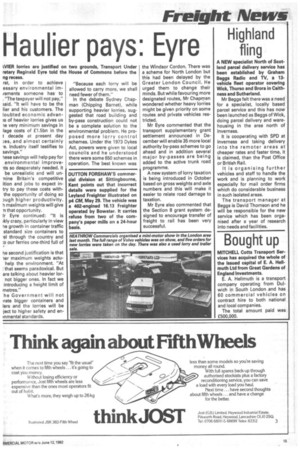Haulier pays: Eyre
Page 9

If you've noticed an error in this article please click here to report it so we can fix it.
WIER lorries are justified on retary Reginald Eyre told the ng recess.
rst, in order to achieve essary environmental imvements someone has to . "The taxpayer will not pay," said. "It will have to be the her and his customers. The loubted economic advanm of heavier lorries gives us le very minimum savings in lage costs of £1.5bn in the t decade at present day ;es, and almost certainly 'e. Industry itself testifies to savings."
hese savings will help pay for environmental improveits so desperately needed. It be unrealistic and will unmine Britain's competitive ition and jobs to expect intry to pay these costs withthe opportunity of doing so ugh higher productivity. h maximum weights will give ri that opportunity.
Ir Eyre continued: "It is ikly crazy, particularly in view he growth in container traffic standard size containers to r el through the country and :o our ferries one-third full of
he second justification is that ler maximum weights actuhelp the environment. "At : that seems paradoxical. But are talking about heavier lornot bigger ones. In fact we introducing a height limit of metres."
he Government will not 'rate bigger containers and lers and the lorries will be iject to higher safety and enmmental standards. "Because each lorry will be allowed to carry more, we shall need fewer of them."
In the debate Sydney Chapman (Chipping Barnet), while supporting heavier lorries, suggested that road building and by-pass construction could not be a complete solution to the environmental problem. He proposed more lorry control schemes. Under the 1973 Dykes Act, powers were given to local councils and he understood there were some 650 schemes in operation. The best known was the Windsor Cordon. There was a scheme for North London but this had been delayed by the Greater London Council. He urged them to change their minds. But while favouring more designated routes, Mr Chapman wondered whether heavy lorries might be given priority on some routes and private vehicles restricted.
Mr Eyre commented that the transport supplementary grant settlement announced in December will enable 35 more local authority by-pass schemes to go ahead and in addition several major by-passes are being added to the active trunk road programme.
A new system of lorry taxation is being introduced in October based on gross weights and axle numbers and this will make it easier to relate road damage to taxation.
Mr Eyre also commented that the Section 8 grant system designed to encourage transfer of freight to rail has been very successful.






















































